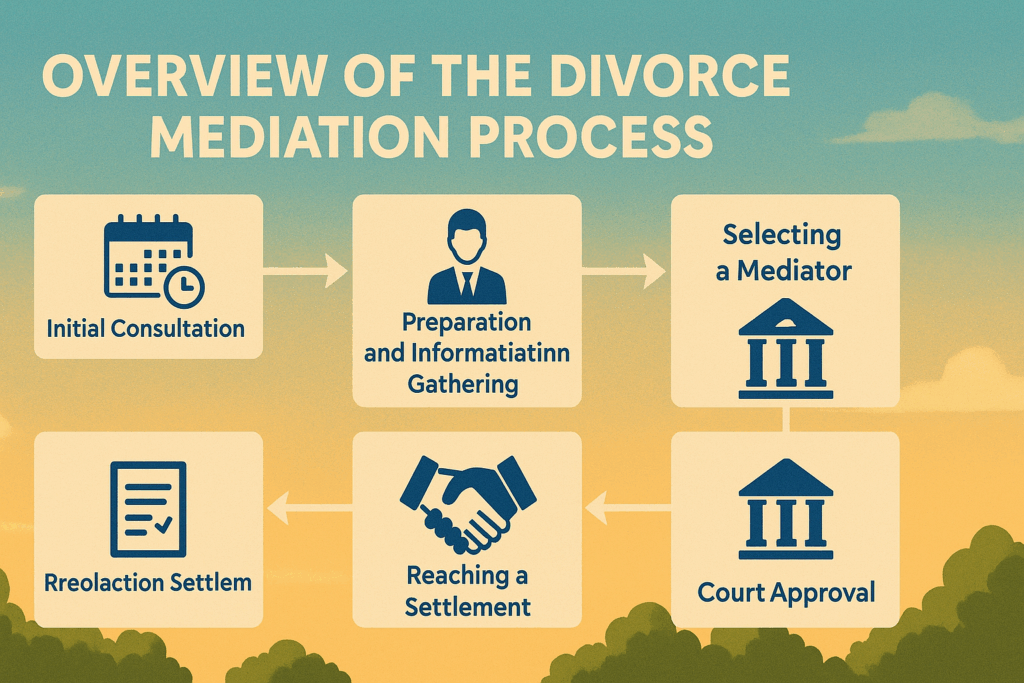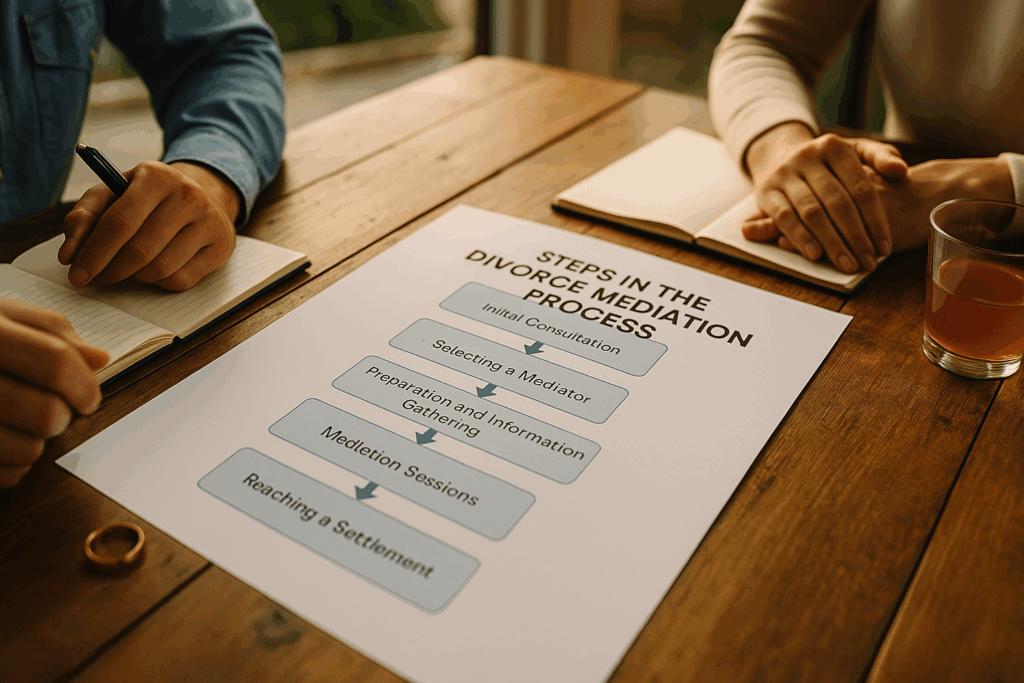
Ever tried balancing your child’s math homework while managing a custody schedule and fielding a sudden call from the school counselor? It’s overwhelming—and during a divorce, that pressure can feel unbearable. Understanding Divorce Mediation Process gives Texas parents a clearer path to protect their child’s academic success while easing the stress and conflict that often accompany custody disputes.
In this post, we’re going to unpack exactly how divorce mediation works, why it’s often a better choice for families with school-age children, and how it can support your child’s education during one of the most uncertain times of their life.
You’ll get practical tips (like how to coordinate with your child’s teachers), legaUnderstanding Divorce Mediation Processl insights most parents miss (yes, Texas courts consider school stability in custody decisions), and real-life stories from families right here in Houston. You’ll also learn how The Law Office of Bryan Fagan, PLLC helps clients create smart, legally sound parenting plans that support educational continuity—and emotional peace of mind.
If you’re navigating school drop-offs, court dates, and spelling tests all at once, keep reading. We’re here to help you move forward—while keeping your child on track.
Key Takeaways
- Divorce mediation is a collaborative process that allows couples to negotiate their divorce terms with the assistance of a neutral mediator, promoting mutual respect and a tailored resolution.
- Mediators facilitate communication and negotiations while remaining neutral, helping parties to achieve a fair settlement without providing legal advice.
- The success of mediation relies on both parties’ willingness to compromise and prioritize cooperation, making it suitable particularly for those seeking amicable resolutions and privacy.
What is Divorce Mediation?
Understanding Divorce Mediation Process is an important first step for Texas couples seeking a respectful and efficient path through divorce. Unlike courtroom litigation—often adversarial and emotionally draining—mediation fosters cooperation by allowing spouses to work with a neutral third party to resolve key issues like custody, support, and property division. As our attorneys frequently advise, this collaborative approach gives both parties control over the outcome, rather than leaving decisions in the hands of a judge.
Under the Texas Family Code §§ 6.602 and 153.0071, mediation is not only encouraged but often preferred in suits involving children or complex property matters. These sections support alternative dispute resolution as a way to promote family stability and reduce conflict. Mediation sessions are confidential, creating a safe space where both sides can speak honestly and work toward tailored agreements that reflect their family’s unique needs. This privacy can be especially valuable when children’s schooling, schedules, and emotional wellbeing are part of the discussion.
Mediation also tends to be more cost-effective than litigation, both financially and emotionally. It avoids drawn-out court battles and allows couples to move forward faster with less stress. According to our family law team, many clients are surprised at how productive these sessions can be—especially when paired with clear financial disclosures and focused goals. You can explore additional insights in our guide: Top Texas Divorce Mediation Options: What You Need to Know.
At The Law Office of Bryan Fagan, PLLC, we’ve helped countless Texas families navigate mediation with dignity and clarity. If you’re considering divorce, we invite you to learn more about how mediation can support a smoother transition at our Divorce Mediation in Texas resource hub. Our mission is simple: educate families, protect futures, and provide trusted legal support every step of the way.

The Role of the Mediator
The mediator has an important function in the divorce mediation process, including:
- Facilitating communication between the parties involved.
- Acting as a neutral third party.
- Facilitating discussions between the spouses to help resolve disputes related to various issues such as child custody and financial matters.
- Remaining completely neutral and not representing either party.
- Ensuring that the mediation sessions are fair and balanced.
Mediators use various techniques, such as empathic listening and power-balancing, to ensure effective communication between the parties. They guide discussions by listening to both parties and helping them reach an agreement without taking sides.
While mediators do not offer legal advice or make decisions, the mediator’s role is to create a productive environment where both parties can communicate effectively and work towards a mutually acceptable solution.
Benefits of Divorce Mediation
One of the most compelling advantages of mediation is its ability to significantly reduce the financial and emotional toll of divorce. Understanding Divorce Mediation Process means recognizing that it often costs far less than litigation and leads to faster, more efficient resolutions. Rather than spending months in court, couples can typically reach agreements in a fraction of the time—minimizing attorney fees, avoiding multiple court appearances, and sharing the cost of a single mediator. As our attorneys frequently advise, this streamlined approach not only saves money but also reduces stress during an already difficult transition.
Mediation also fosters a collaborative environment that supports mutual respect and long-term cooperation. Couples are encouraged to work together toward customized solutions that reflect their family’s specific needs—something rarely possible in the rigid structure of courtroom litigation. This is especially important when children are involved. According to Texas Family Code §153.0071, mediation is not only permissible in suits affecting the parent-child relationship—it’s often encouraged. Updated provisions in the Code continue to highlight mediation as a preferred tool for resolving disputes related to custody, visitation, and support while protecting the child’s best interest.
Participants frequently report higher satisfaction with mediation outcomes, as the process encourages compromise and empowers both parties to maintain control over the terms of their divorce. Rather than having decisions handed down by a judge, spouses can craft agreements that are more thoughtful, more flexible, and ultimately more sustainable. This can lead to healthier co-parenting relationships and smoother post-divorce transitions—outcomes we’ve seen time and again in our work with Texas families.
To learn more about the practical and legal advantages of mediation, we recommend reviewing this in-depth article on divorce mediation options for Texas couples. You can also explore our dedicated Divorce Mediation in Texas page for answers to frequently asked questions and next steps. At The Law Office of Bryan Fagan, PLLC, our mission remains clear: to educate families, protect futures, and help our clients navigate divorce with clarity, dignity, and control.

Is Divorce Mediation Right for You?
Determining whether divorce mediation is the right choice for you involves considering several factors. Successful mediation often requires both parties to have a willingness to compromise and prioritize their children’s best interests. Additionally, for mediation to be effective, both individuals must feel secure and supported throughout the negotiation process.
Mediation can help reduce conflict between parties, making it a favorable option for couples looking for amicable resolutions. However, in situations where there is a history of domestic violence or where parties are unwilling to cooperate, mediation may not be suitable.
Mediation is ideal for couples seeking privacy and flexibility, and for those aiming to maintain a long-term co-parenting relationship post-divorce through private mediation.
Steps in the Divorce Mediation Process
Understanding Divorce Mediation Process means more than simply choosing an alternative to litigation—it involves following a clear, structured path that empowers couples to resolve issues collaboratively and confidently. According to our family law team at The Law Office of Bryan Fagan, PLLC, the Texas mediation process generally includes several vital stages: an initial consultation, selecting a qualified mediator, gathering and organizing essential documents, participating in one or more mediation sessions, reaching a settlement, and finally, obtaining court approval to formalize the agreement.
Each of these steps plays an important role in creating a durable, legally sound resolution. For example, during the preparation phase, parties are encouraged to provide full financial disclosures—a requirement reinforced by Texas Family Code §6.602, which governs mediated settlement agreements. The latest updates to the Code continue to emphasize transparency and fairness as cornerstones of any enforceable agreement, especially in cases involving complex property division or child custody. As we’ve seen in our work with Texas families, thorough preparation and honest communication are the foundation of successful mediation outcomes.
Once a settlement is reached, it must be reduced to writing and signed by both parties, and, under the Texas Family Code, it becomes binding when it clearly states that it is not subject to revocation. From there, the court may approve the agreement and incorporate it into the final divorce decree. Mediation not only offers a faster route to closure but also protects families from the emotional strain and unpredictability of a courtroom battle. This step-by-step framework allows both parties to maintain control over critical decisions, with the support of experienced legal guidance.
For a deeper look into each phase of the divorce process and how mediation fits in, explore our featured article: Insight into the Steps in the Texas Divorce Process. You can also visit our Texas Divorce Mediation resource page for tools, FAQs, and personalized support. Our legal professionals have helped many clients understand what to expect at every stage—ensuring they’re prepared, protected, and informed every step of the way.

Initial Consultation
The initial consultation in the divorce mediation process is designed to set the stage for a successful mediation. During this first mediation session, the mediator:
- Explains their role
- Outlines the rules of the process
- Sets clear expectations for both parties
- Gathers background information
- Identifies the key issues that need to be addressed
- Assesses whether mediation is a suitable option for the parties involved
Setting ground rules during the initial consultation is essential to promote respectful communication and prevent emotional disruptions during mediation sessions. The mediator provides valuable guidance and outlines the mediation process, helping both parties understand what to expect and how to prepare for the settlement discussions.
Selecting a Mediator
Choosing the right mediator is a critical step in the divorce mediation process. When selecting a mediator, it’s important to consider:
- Their experience
- Their training
- Their familiarity with the divorce laws in your state
- Their style and approach to facilitating discussions, as this can significantly impact the effectiveness of the mediation process
It’s crucial to feel comfortable with their methods.
Potential mediators can be found through:
- Personal referrals
- Online mediation services
- Local courthouses
- State bar associations
Taking the time to select a skilled mediator who aligns with your needs and preferences will help ensure a successful mediation and a fair mediated agreement.
Preparation and Information Gathering
Understanding Divorce Mediation Process begins long before the first negotiation takes place—it starts with thoughtful preparation and detailed information gathering. As our legal professionals have helped many clients understand, the success of mediation often hinges on how well both parties prepare. This includes making full and transparent financial disclosures, a requirement supported by Texas Family Code §6.602, which outlines the conditions for a binding mediated settlement agreement. These disclosures must account for all assets, liabilities, income, and expenses so that both sides can make informed, balanced decisions.
Gathering relevant documents is more than just a paperwork exercise—it’s an essential step that promotes fairness and avoids future disputes. Financial statements, tax returns, loan documents, and records of retirement accounts or business interests all help paint a full picture of the marital estate. The most recent updates to the Texas Family Code reinforce the importance of transparency, especially in complex or high-asset divorces where omissions can undermine the enforceability of the final agreement.
Clarifying your personal goals—whether financial stability, preserving parenting time, or keeping the family home—is equally important. According to our family law team, taking time to define what matters most can shift the tone of mediation from reactive to proactive. This clarity supports more focused discussions and often leads to creative, customized outcomes that benefit everyone involved, especially children. When both parties approach mediation with clarity and honesty, the process tends to be faster, less stressful, and more successful in reaching a lasting resolution.
For more on the comprehensive support our attorneys provide in preparing clients for mediation and settlement negotiations, visit our article: Key Aspects of Texas Divorce Attorney Services for Clients. You can also explore our Divorce Mediation Services page to learn how The Law Office of Bryan Fagan, PLLC can help you prepare with confidence and move forward with peace of mind.

Mediation Sessions: What to Expect
Mediation sessions typically involve structured negotiations where the mediator documents agreements and identifies unresolved issues. The process generally comprises the following stages:
- Introducing the procedure
- Gathering relevant information
- Identifying issues
- Framing needs
- Negotiating solutions
- Finalizing agreements
During these sessions, mediators facilitate discussions to ensure both parties can address their concerns within a structured environment. Shuttle mediation aims to create a collaborative atmosphere.
Common issues addressed during mediation include property division, child custody arrangements, spousal support, and ensuring a reduction in conflict. Mediators help couples navigate discussions about crucial topics like property division, child custody arrangements, and spousal support. Child custody arrangements are prioritized, with mediators assisting in creating schedules and guidelines for decision-making, often involving child psychologists to provide valuable insights.
Participants are encouraged to share information honestly and openly to foster a collaborative environment. This open communication helps in addressing each party’s concerns and finding mutually agreeable solutions. The goal of the mediation sessions is to achieve a comprehensive mediated agreement that addresses all aspects of the divorce.
Reaching a Settlement Agreement
Reaching a settlement agreement is one of the most critical milestones in the mediation journey. Understanding Divorce Mediation Process means recognizing that the final agreement reached in mediation—while powerful—is only the first step toward legal enforceability. As our attorneys frequently advise, once both parties arrive at mutually acceptable terms, a mediator may prepare a preliminary draft. An attorney must transform this draft into a formal Marital Settlement Agreement, and both parties must review it to ensure all interests—especially those involving children and finances—are fully protected.
Under Texas Family Code §6.602, a mediated settlement agreement becomes binding when it meets specific statutory requirements, including language stating that the agreement is not subject to revocation and signatures from both parties and their attorneys. Courts in Texas generally uphold these agreements, provided they are not fundamentally unfair or contrary to a child’s best interests. The most recent updates to the Family Code continue to emphasize judicial efficiency and parental autonomy—encouraging cooperation and reducing the burden on Texas courts when families can resolve matters through mediation.
At this stage, it’s essential to address every major issue—spousal support, division of community property, parenting time, and child support. According to our family law team, a comprehensive agreement should reflect both parties’ goals and the realities of their family dynamic. This includes understanding how to calculate support, structure co-parenting arrangements under Texas Family Code Chapter 153, and draft enforceable terms that the court can incorporate into the final decree. A carefully negotiated settlement agreement reduces future conflict and ensures your family has a roadmap that works in real life—not just on paper.
For additional insights into how custody and parenting arrangements are handled during mediation, we recommend reading: Navigating Texas Custody Agreements for Family Stability. You can also explore our Child Custody Services to learn how The Law Office of Bryan Fagan, PLLC helps parents create parenting plans that prioritize stability and long-term well-being. Our legal professionals have helped many clients understand what’s possible when cooperation and clarity are placed at the center of the divorce process.

Legal Advice During Mediation
Understanding Divorce Mediation Process isn’t just about knowing the steps—it’s also about knowing who to turn to for trusted legal guidance along the way. Mediators play a neutral role in facilitating discussions, but they cannot provide legal advice. That’s why, as our attorneys frequently advise, having an experienced Texas family law attorney in your corner during mediation is essential. A consulting attorney protects your rights, answers your questions, and guides your decisions—especially in high-stakes issues like custody, support, and property division.
Under Texas Family Code §6.602, mediated settlement agreements become binding when properly executed, meaning your signature may finalize important obligations that impact your financial future and parental rights. Recent updates to the Code clarify the enforceability of these agreements and reinforce the need for careful legal review before signing. By working with a knowledgeable attorney throughout the process—not just at the end—you gain confidence in what you’re agreeing to and avoid costly missteps.
Our legal professionals have helped many clients understand the value of involving an attorney early, even when mediation feels amicable. Whether it’s reviewing the terms of a proposed parenting plan or advising on spousal support calculations, a consulting attorney can offer practical insights that support better outcomes. Should you feel overwhelmed or uncertain at any point, your lawyer can guide you between sessions, helping you refocus and stay aligned with your long-term goals.
To connect with a legal team that puts your family’s future first, visit our page on Texas Divorce Attorney Services. You can also explore divorce mediation resources and other educational tools designed to give Texas families clarity, confidence, and peace of mind. At The Law Office of Bryan Fagan, PLLC, we’re here to walk with you through every conversation, decision, and next step.
Common Challenges in Mediation and How to Overcome Them
While mediation offers a path toward resolution that’s often more peaceful and cost-effective than litigation, it’s not without its challenges. Understanding Divorce Mediation Process means recognizing that emotional tension, communication breakdowns, and disputes over child custody or property can still arise—even in a cooperative setting. According to our family law team, these difficulties are not uncommon, and with the right tools, families can navigate them successfully without turning to the courtroom.
One of the most frequent hurdles our legal professionals have helped clients overcome is emotional stress. Divorce is deeply personal, and bringing strong feelings into negotiation can derail progress. That’s why Texas mediators often employ techniques like active listening and reframing to de-escalate tense moments. The Texas Family Code §153.0071 supports mediation in suits involving the parent-child relationship and encourages the use of professional mediators to guide parents toward child-focused solutions, even when emotions run high. Recent updates to the Code have continued to emphasize mediation’s role in safeguarding children’s best interests through more flexible and efficient dispute resolution.
Communication barriers are another common issue—especially when there’s a history of conflict. As our attorneys frequently advise, preparation is key. Entering mediation with well-defined goals, documented financial disclosures, and a willingness to compromise can reduce misunderstandings and help both parties stay focused on shared priorities. Even in cases involving complex asset division or custody disagreements, a skilled mediator can help couples break through impasses by introducing creative alternatives and reframing areas of disagreement into common ground.
For more on how to navigate obstacles in mediation and what resources are available, we recommend exploring Texas Divorce Mediation Options for a Smooth Transition. You can also visit our Divorce Mediation Services page to learn how The Law Office of Bryan Fagan, PLLC equips Texas families with practical tools and compassionate legal guidance to move forward—no matter how complex the case may seem.

Emotional Difficulties and Communication Barriers
Emotional challenges often arise during mediation, affecting discussions and negotiations. Improving communication during mediation involves acknowledging emotions and maintaining respect throughout discussions. Some conflict is normal, but a competent mediator prevents name-calling and focuses discussions on the future.
Parties should be open to listening and considering each other’s perspectives to help manage emotional challenges. Fostering productive discussions and ensuring that both parties communicate effectively allows them to express their feelings and needs effectively.
Disagreements over Child Custody and Property Division
Disagreements over child custody often involve issues such as visitation arrangements, decision-making authority, parenting responsibilities, and the child’s best interest. Strategies for negotiating child custody arrangements include being open to flexible schedules, considering the children’s perspectives, and prioritizing their emotional well-being.
Property division disputes usually encompass the categorization of assets, valuation, and equitable distribution between spouses. When negotiating property division, having a clear understanding of each spouse’s financial needs and contributions can foster a collaborative environment. Utilizing break times during heated discussions allows both parties to recharge and return to negotiations with a clearer head.
Encouraging a solution-oriented mindset during mediation can help transform disagreements into collaborative law problem-solving opportunities. Maintaining communication and a cooperative attitude can lead to more satisfactory outcomes in both custody and property division disputes.
Overcoming Impasses
Occasionally, couples may find themselves at an impasse, unable to reach an agreement despite extensive discussions. In such cases, it’s crucial to remain open to compromise and consider all available options before resorting to traditional litigation, which can involve significant court costs. Litigation can be costly, time-consuming, and emotionally draining, with the final decision left in the hands of a judge rather than the divorcing parties, often leading to a traditional court proceeding.
Overcoming impasses may involve allowing a cooling-off period to reassess positions and revisit issues later with a fresh perspective. Employing a mediator’s help to guide parties toward compromise when stuck in a deadlock can also be highly effective.
Prioritizing mutual respect and identifying common goals can help reframe discussions and foster a spirit of collaboration, ultimately leading to a mutually agreeable solution.
Post-Mediation: Implementing the Agreement
Once both parties have signed the mediated agreement, the following steps occur:
- The agreement is submitted to the court for the purpose of obtaining approval.
- The mediator typically drafts a written document summarizing the agreement.
- Once signed, this document serves as a binding contract.
- If the mediation agreement is part of an ongoing court case, it can be submitted for incorporation into the official court record.
The court may issue a consent decree based on the mediated agreement, making it enforceable by law. If one party does not comply with the agreement, the other can file a motion in court to enforce it.
Mediation outcomes typically cannot be appealed unless they are turned into a court order, emphasizing the importance of ensuring that both parties are satisfied with the final agreement. This legal process ensures that the agreed-upon terms are upheld and provides a clear path forward for both parties during court proceedings.
Conclusion:
Divorce is never simple, but it doesn’t have to disrupt your child’s education or emotional stability. The way you handle conflict during this time can leave a lasting mark on your child’s future. Understanding Divorce Mediation Process isn’t just about navigating the law—it’s about choosing a parenting approach that reduces stress and keeps your child’s well-being front and center.
At The Law Office of Bryan Fagan, PLLC, we’ve guided countless Texas families through mediation, helping them create custody agreements that truly work. Mediation offers parents a way to resolve disputes without dragging children through courtroom battles, making school drop-offs and daily routines far less overwhelming.
If you’re ready to explore your options, or even if you’re unsure of your next step, our team is here to help. We’ll listen, guide, and walk you through the process so you can move forward with clarity and peace of mind.
And if you managed to read this while helping with homework, consider it proof you’ve already got what it takes. Let’s make sure the rest of your journey is just as smart and steady.
- When Does Divorce Mediation in Texas Make Sense for Couples?
- Navigate Your Texas Divorce Mediation Options With Ease
- Texas Divorce Mediation Benefits for Your Peace of Mind
- Why Choose Collaborative Divorce Mediation in Texas?
- Choosing Collaborative Divorce Mediation in Texas: Key Insights
- Texas Divorce Mediation: A Supportive Path to Resolution
- Top Texas Divorce Mediation Options: What You Need to Know
- Texas Divorce Mediation Options for a Smooth Transition
- Texas Divorce Mediation Services Tailored for Your Situation
- Finding Affordable Divorce Mediation in Texas: Your Guide to Low-Cost Solutions
Frequently Asked Questions About Divorce Mediation
What not to say in divorce mediation?
Avoid saying anything accusatory, threatening, or emotionally charged. Mediation is about collaboration. Statements like “You always do this!” or “I’ll never agree to that!” can derail progress. Stick to facts, stay respectful, and focus on solutions.
What is the average settlement offer during mediation?
There’s no universal average, as settlement offers vary widely based on income, assets, debts, custody arrangements, and more. In Texas, fair settlements aim to achieve a just and right division under the Texas Family Code, often through equitable—not necessarily equal—distribution.
What is the downside to divorce mediation?
If one party is unwilling to compromise or there is a significant power imbalance, mediation can be ineffective. Additionally, mediation doesn’t work well in cases involving domestic violence, hidden assets, or a refusal to disclose financial information.
What are the 5 steps of mediation?
The five common steps are: (1) Introduction and ground rules, (2) Statement of the problem, (3) Information gathering, (4) Negotiation and generation of options, and (5) Reaching agreement and drafting a settlement.
What is the golden rule of mediation?
The golden rule of mediation is mutual respect. Participants should treat each other with dignity, listen actively, and engage in good faith to reach a fair outcome—especially important when children are involved.
Who loses the most in a divorce?
While every divorce is different, children often suffer the most emotionally when conflict is high. Financially, both parties may feel the impact. However, those who don’t seek legal advice or attempt a collaborative process often face the most long-term losses.
What is an acceptable settlement offer?
An acceptable offer is one that considers both parties’ financial needs, the best interests of any children, and aligns with Texas law. It typically includes a fair division of assets and debts, appropriate support, and clear parenting arrangements.
How much money should I ask for in a settlement?
The amount depends on your financial needs, earning capacity, lifestyle during the marriage, and Texas property division laws. An attorney can help you calculate a reasonable figure based on these factors and what a judge might find fair.
What is a reasonable full and final settlement offer?
A reasonable full and final settlement is one that provides financial closure, equitably divides community property, and fairly addresses spousal and child support. It should be legally sound and sustainable for both parties moving forward.






